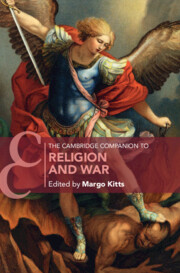Book contents
- The Cambridge Companion to Religion and War
- Cambridge Companions to Religion
- The Cambridge Companion to Religion and War
- Copyright page
- Contents
- Contributors
- Preface
- Introduction
- Part I Classical Foundations
- Part II Just War
- 9 Judaism and the Ethics of War
- 10 The Idea of Just War in Christian Thought from the Age of Augustine through the Early Modern Period
- 11 Islam and the Just War Tradition
- 12 Is There a Hindu Just War?
- 13 Buddhist Just War Traditions
- Part III Religious Nationalism
- Part IV Featured Conflicts
- Index
- Cambridge Companions to Religion (continued from page ii)
- References
11 - Islam and the Just War Tradition
Postclassical Developments
from Part II - Just War
Published online by Cambridge University Press: 04 May 2023
- The Cambridge Companion to Religion and War
- Cambridge Companions to Religion
- The Cambridge Companion to Religion and War
- Copyright page
- Contents
- Contributors
- Preface
- Introduction
- Part I Classical Foundations
- Part II Just War
- 9 Judaism and the Ethics of War
- 10 The Idea of Just War in Christian Thought from the Age of Augustine through the Early Modern Period
- 11 Islam and the Just War Tradition
- 12 Is There a Hindu Just War?
- 13 Buddhist Just War Traditions
- Part III Religious Nationalism
- Part IV Featured Conflicts
- Index
- Cambridge Companions to Religion (continued from page ii)
- References
Summary
Postclassical Muslim just war developments focused upon dealing with the twin challenges of the Crusades and the Mongols, both of which occupied substantial sections of the Muslim world as well as constituting religious challenges to Islam. These challenges were overcome by moving away from the earlier heroic manner of Muslim sacral warfare and adopting a more professional, technology-based military that at least attempted to assimilate standard Sunni Muslim norms (in terms of personal morality) into the military methodology. The expansion of Islam from the 13th to the 17th centuries demonstrated that this formula was a success.
- Type
- Chapter
- Information
- The Cambridge Companion to Religion and War , pp. 255 - 268Publisher: Cambridge University PressPrint publication year: 2023



